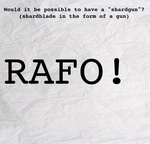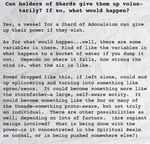Brandon Sanderson
Title Page
You'd be surprised how much can be said about the title of this book. Naming books is one of the most frustrating, and most fulfilling, elements of writing. I'm more fortunate than some authors I know–for most of my books, the names came easily. Sometimes, I even came up with the title before I wrote the book. (This has actually only happened once, when thought up the phrase "The Way of Kings," and thought "Man! That would be a great title for a book!")
Elantris has had several titles. During the rough draft phase, I simply called it "SPIRIT." I knew that the main character's name would be based on the character for Spirit, and that would also be the name he took for himself when he was in exile. I never intended this to be the final title for the manuscript, but it was what I named all the files when I was typing the work.
Those of you who've read the book realize the special significance of "Spirit" (or Aon Rao as it eventually became known) to the climax of the story. I'll talk more about this in a bit.
Well, as I was writing the story, I realized I needed a better title. The most obvious choice was to somehow work in the name of the fallen magical city that was the focus of the book. Now, I'm a little embarrassed to admit this, but the city "Elantris" was actually originally named "Adonis." I'm not sure what I was thinking. Sometimes, when you're coming up with a lot of fantastical names, you create words that have a certain, unforeseen connotations or connections. In this case, I wasn't even thinking of the Greek myth. "Ado" was simply the Aon I chose to base the city’s name around, and "Adonis" (Pronounced with a long "A" and a long "O") was the word that came out of that Aon.
So, I named the book The Spirit of Adonis, hoping to play off of Raoden's name.
It was, however, actually a three-fold pun. I included this line–"The Spirit of Adonis" at the climax, when Raoden realizes that the city itself formed an enormous Aon Rao.
I didn't realize what I'd done until my writing group met for the first time, and they said "I like the beginning of the book. I'm having trouble figuring out what this has to do with the Greeks. Is it because the god-like people were so arrogant?"
Then it hit me. Adonis, from Greek mythology, was a beautiful man loved by Aphrodite. The word has become a kind of paradigm for a beautiful–almost perfect–specimen of the male species. And I had unwittingly named my book after him.
Let's just say I changed that pretty quickly. However, I needed a new name for the city. I played with a number of different combinations of Ado, but somehow ended up trying up different sounds and combinations. Thankfully, I came up with the word "Elantris." As soon as I wrote it down, I knew this was my city. It sounded grand without being overbearing, and it had a mythological feel to it (hearkening slightly to "Atlantis".) I renamed the book "The Spirit of Elantris," and proceeded.</p>
Then came time to send out the manuscript. I had had some comments on the book–people liked "Elantris," but the "spirit of" was less popular. I tried several iterations, and even sent out some query letters calling the book "THE LORDS OF ELANTRIS." That just felt too cliché fantasy for me, however, and I eventually returned to "The Spirit of Elantris."
Finally, the book got sold. At this point, my editor (Moshe Feder) suggested that we shorten the title to simply Elantris. Remembering how other people had been unimpressed with the "spirit of," I agreed. Now that I've seen the cover lettering and worked with it as "Elantris" for some time, I'm very pleased with the change. The new title has more zip, and makes the book sound more majestic. I still get to have a reference to my old title, as Part Three of the book is called "The Spirit of Elantris."
Of course, even this title isn't without its problems. People have trouble spelling it when I say the title, and some think of the car named the "Elantra." At one panel, I even had one person miss-hear me, thinking the name of the book was "The Laundress." That would certainly be a different book...


